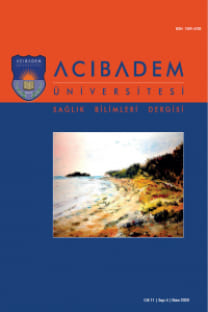Türkiye’de Meme Kanseri Farkındalığı ve Tarama Programı
Screening Program and Breast Cancer Awareness In Turkey
___
Parkin DM, Bray F, Ferlay J, Pisani B. Global cancer statistics, 2002. CA Cancer J Clin 2005;55:74-108.T.C. Sağlık Bakanlığı sağlık istatistikleri yıllığı 2010.ss.27-8. http://sbu. saglik.gov.tr/Ekutuphane/kitaplar/saglikistatistikleriyilligi2010.pdf
Ozmen V. Breast cancer in the World and Turkey, J Breast Health 2008;4:6-12.
Fidaner C, Eser SY, Parkin DM. Incidence in Izmir in 1993-1994: first results from Izmir Cancer Registry. Eur J Cancer 2001;37:83-92.
Moss SM, Cuckle H, Evans A, Johns L, Waller M, Bobrow L; Trial Management Group. Effect of mamographhic screening from age 40 years on breast cancer mortality at 10 years follow-up: a randomised controlled trial. Lancet 2006;368:2053-60.
Alexander FE, Anderson TJ, Browb HK, Forrest AP, Hepburn W, Kirkpatric AE, et al. 14 years of follow-up from Edinburg randomised trial of breast cancer screening. Lancet 1999;353:1903-8.
Ulusal Kanser Kontrol Programı 2009-2015 (Yayın.no.760). Tuncer M (Editor). Ankara: T.C. Sağlık Bakanlığı, Kanserle Savaş Dairesi Başkanlığı, 2009.
Meme Kanseri Tarama Programı Ulusal Standartları. kanser.gov.tr/ Dosya/tarama/meme.pdf
Yip CH, Smith RA, Anderson BO, Miller AB, Thomas DB, Ang ES, et al. Guideline implementation for breast healthcare in low and middle- income countries, early detection resource alocation. Cancer 2008;113:2244-56.
Reynolds T. Declining breast cancer mortality: what’s behind it? J Natl Cancer Inst 1999;91:750 –3.
Cancer Facts and Figures, American Cancer Society, 2014. http:// www.cancer.org/acs/groups/content/@research/documents/ webcontent/acspc-042151.pdf
Secginli S, Nahcivan NO. Factors associated with breast cancer screening behaviors in a sample Turkish women: a questionnaire survey. Int J Nurs Stud 2006;43:161-71.
Kılıç D, Sağlam R, Kara Ö. Üniversite öğrencilerinde meme kanseri farkındalığını etkileyen faktörlerin incelenmesi, J Breast Health, 2009;5;195-99.
Singletary SE. Rating the risk factors for breast cancer. Ann Surg 2003;237:474-82.
Gulluoglu BM. Risk factors. Essentials in the Management of Breast Diseases’da.Ed. Gazioğlu E. Bucharest, Celcius Medical Publishing 2005;131-45.
Ravdin PM, Cronin KA, How lander N, Berg CD, Chelobowski RT, Feuer EJ, et al. The decrease in breast-cancer incidance in 2003 in the United States. N Eng J Med 2007;356:1670-4.
Kayhan A, Arıbal E. Meme kanseri taraması: Neden yapıyoruz? Ne zaman? Değerlendirmede yaşanan sorunlar. Trd Sem 2014;2:230-40.
Robson M, Offit K. Management of an inherited predisposition to breast cancer. N Eng J Med 2007;357:154-62.
National Comprehensive Cancer Network Clinical Practice
Guidelines in Oncolocy (NCCN Guidelines®), Breast Cancer Screening and Diagnosis, Version 1.2015. http://www.nccn.org/professionals/ physician_gls/pdf/breast-screening.pdf
National Comprehensive Cancer Network Clinical Practice
Guidelines in Oncolocy (NCCN Guidelines®), Genetic/Familial High Risk Assessment: Breast and Ovarian, Version 2.2015. http://www. nccn.org/professionals/physician_gls/pdf/genetics_screening.pdf
- ISSN: 1309-470X
- Yayın Aralığı: Yılda 4 Sayı
- Başlangıç: 2010
- Yayıncı: ACIBADEM MEHMET ALİ AYDINLAR ÜNİVERSİTESİ
Türkiye’de Meme Kanseri Farkındalığı ve Tarama Programı
Ramazan KOZAN, Vehbi Yavuz TOKGÖZ
Çocuk Yoğun Bakım Ünitesi’nde El Temizliği Kurallarına Uyumun Değerlendirilmesi
Seher ERDOĞAN, Melek URGUN, Hatice KAYA, Belgin YİĞİT, Mehmet BOŞNAK
S. Haluk ÖZSARI, Haydar HOŞGÖR, Derya Gündüz HOŞGÖR
FAHR SENDROMLU BİR OLGUDA BEYİN SAPI TUTULUMU
Larsen Sendromlu Pediatrik Hastada Anestezi Yönetimi
Mahmut Alp KARAHAN, Nuray ALTAY, Hasan Hüsnü YÜCE, Mehmet EROĞLU
El Yıkama ve Paraziter Hastalıklar Eğitimi: Okul Çocuklarının Bilgi ve Davranışları Üzerine Etkisi
İlknur BİLGİN, Funda EVCİLİ, Nurdan KAYA, Mine BEKAR
Hastanelerde İşe Yeni Başlayan Hemşirelerin Sorunları
Havva ÖZTÜRK, Şule KURT, Gül Mersinlioğlu SERİN, Betül BAYRAK, Tuğba BALIK, Birsel Canan DEMİRBAĞ
